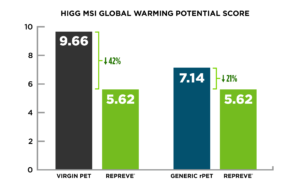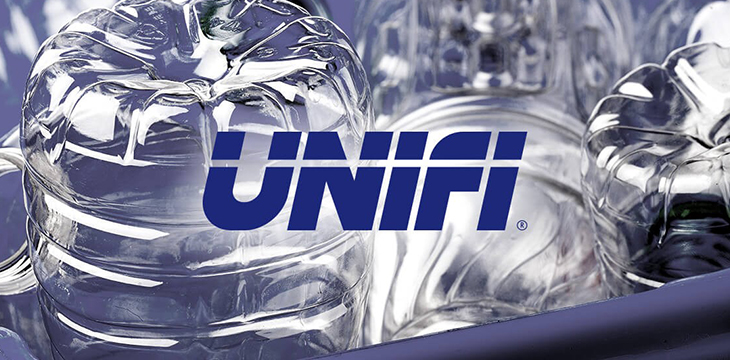Unifi’s Repreve recycled fibre reduces the global warming potential by 42%, according to its first Higg Materials Sustainability Index (MSI) score.
Unifi, a manufacturer of synthetic and recycled performance fibres, has received its first Higg Materials Sustainability Index (MSI) score for its Repreve fibre, which is made from recycled plastic bottles.
The Higg MSI study confirms that Repreve reduces the global warming potential (GWP) by 21% compared to generic, mechanically- recycled polyester and 42% compared to conventional virgin polyester.
“We’ve been working with the Sustainable Apparel Coalition (SAC), the backing organisation for the Higg MSI, for a number of years and truly admire the work it is doing to ensure that traceability, quality and environmental impact claims are verified,” says James Cooper, sustainability manager, Unifi.
“Unifi believes sustainability starts with transparency of our Repreve product, and the Higg MSI scores provide an extra level of accuracy of and clarity to the impact of our product. We’re most excited about the visibility this gives our customers as it presents a more visible and verifiable pathway to reducing their environmental impact and carbon footprint.

The Higg MSI also measures eutophication, fossil fuels, water scarcity and chemistry
To receive a Higg MSI score, Unifi provided its own internal data to the SAC through submission of an externally conducted Life Cycle Assessment (LCA) study (a tool that measures the environmental impacts over the whole life cycle of a product or service, including emissions and consumption of material resources) that adhered to ISO 14040/14044 standards. This provided a carbon dioxide equivalent (CO2e) impact for Repreve and allowed the SAC to assign a Higg MSI GWP score. The Higg MSI scores are based on an LCA reviewed by the global, multistakeholder non-profit alliance for the consumer goods industry, Sustainable Apparel Coalition, and its technology partner, Higg Co.
The primary factors contributing to the GWP score are emissions though the combustion and consumption of fossilbased energy sources. However, there are other variables that contribute to climate change included in the background data, also measured in CO2e that ensures the Higg MSI GWP score is as comprehensive an estimate as possible.
“The Repreve score is a combination of background Higg MSI data and data from our process, specifically for the energy and fuel used within our scope,” Cooper explains. “The background data for generic virgin and mechanically recycled PET from the Higg MSI is from GaBi, one of the largest internally consistent life cycle inventory databases available.
“While efficiency and manufacturing processes are key, they are one of multiple variables that contribute to the GWP of a material. The difference highlighted with this analysis is in our known process data and the estimated background data provided by GaBi.”
Beyond the global warming potential, the Higg MSI also measures environmental impact in nutrient pollution in water (eutrophication), water scarcity, use of fossil fuels (abiotic resource depletion), and chemistry.
In future, Cooper says that Unifi will continue to improve the environmental impact of its Repreve fibre. In fact, lowering its environmental impact is a continuous pursuit for the company, he says. “We continue to prioritise and invest into research and manufacturing technology that will both lower impact and drive production efficiency,” Cooper adds. “We also anticipate further advancement with our regional energy grids, especially in North Carolina, US, to aid us in further reducing carbon footprint.”
The Higg MSI scores are used to communicate credible data about a product’s performance and validate sustainability progress. These results serve as a public scorecard for sharing the profile and data of a product’s environmental impact, which provides designers and consumers alike with information to make sustainability-based purchasing decisions.
www.wtin.com

